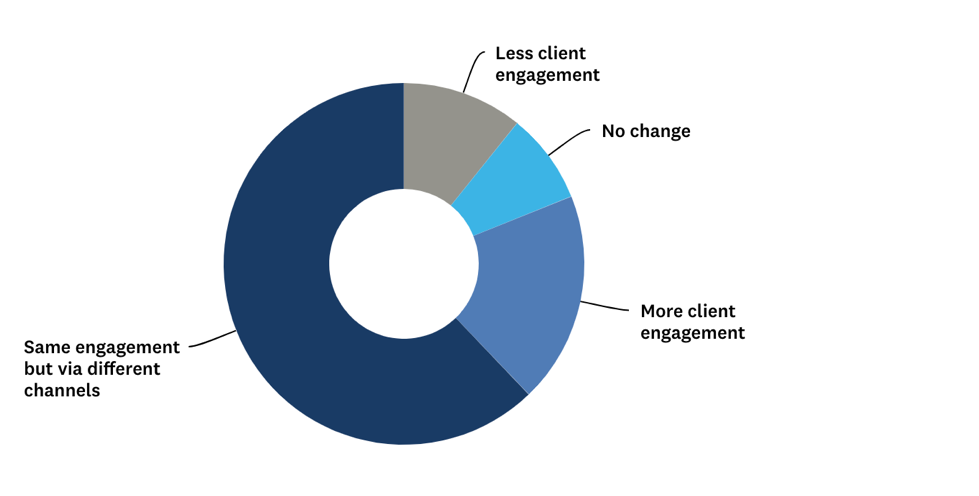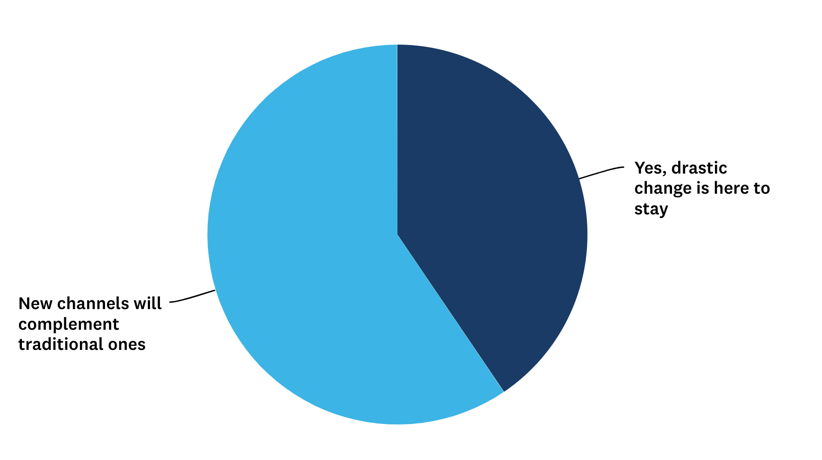Geographic flexibility and the new world of work in the legal sector
Back to Law Firm Management Committee publications
Juan Luis Avendaño
Affinitas and Miranda & Amado, Lima
jlavendano@mafirma.com.pe
At the time of writing, the World Health Organization (WHO) declared Latin America the new epicentre for Covid-19.[1] As the pandemic continues to rage and gather strength in the region, law firms and much of their client base remain in lockdown mode and have largely moved to work-from-home (WFH) or work-from-anywhere arrangements.
This unprecedented workforce disruption created a new geographic flexibility that is likely to have profound effects on corporate culture and the world of work in the legal sector. Zoom Chief Executive Officer, Eric Yuan, anticipates: ‘This coronavirus […] will dramatically change the landscape and lead to a fundamental, permanent shift in how people work.’
The jury is still out as to the effects of this massive workforce shift. Some reports signal negative effects as the experience of remote working can lead to inefficiency, higher risks of burn-out and loneliness, increased cybersecurity threats and reduced cohesion of teams. Others point to its positive impact, including higher productivity, time saved from commuting, fewer distractions from co-workers and fewer – and more effective – meetings.
The abrupt shift to a remote-working environment has definitely led to an acceleration of digital transformation projects and adoption of technologies. Office routines have been replaced by so-called ‘asynchronous’ communication and collaboration on virtual whiteboards, in webcasts and messaging channels.
A survey carried out among the 83 partners of Affinitas[2] offer some clues as to the changes taking place in the sector. While some partners indicate more client engagement since the Covid-19 lockdown (18 per cent say they have more contact, versus 11 per cent that indicate they have had less client engagement and eight per cent who report no major changes), the majority of partners (62 per cent) indicate they have about the same level of client engagement, but via new communication channels. The adoption of videoconferencing technology is impressive, with over 60 per cent reporting it as the main channel for client contacts and over 90 per cent of partners using videocalls to coordinate with their teams.
Through short and efficient video meetings, usually not more than 30 minutes, partners are checking in with clients and team members around the world. The format allows catching up on a very personal and direct level, but without the hassle of travel or commute. We anticipate these new formats will remain a fixture and replace many of the meetings and conferences we used to participate in.
What best describes your level of client engagement during lockdown?

Do you think the pandemic will change client and team engagement in the long term?

As companies and law firms are likely to start experimenting with more permanent ways of remote working arrangements,[3] it is interesting to gauge the effects on cross-border collaboration, client engagement and internal organisation. For an organisation such as Affinitas, it is particularly relevant to assess the effects of these trends on collaboration of legal teams in a cross-border context and across the different models that have emerged in the global legal marketplace. None of the partners surveyed believe that the situation will return to normal after the pandemic, with over 40 per cent stating they expect the ‘radical changes’ for client and team engagement to stay, and nearly 60 per cent indicating that the new communication channels will stick around, but rather as a complement to the traditional forms of interaction. Our survey also indicates that about half of the respondents have participated as speaker or panellist in webinars, with 30 per cent indicating an increase in such activity. The Affinitas member firms’ client relationship management and business development programmes seem to have quickly adapted to the new situation, with about two-thirds of partners stating that they have participated in specific programmes and activities during the lockdown period.
While large law firm alliances put international reach at the heart of their value proposition, cross-border collaboration and integration within such firms has not always followed suit. Despite operating under the same banner, the degree of integration and connectivity varies greatly. The sheer number and diversity of offices that make up some of these alliances and referral networks also make collaboration and alignment a difficult prospect. The efforts to stimulate further integration and collaboration in such organisations are mostly top-down exercises driven by leadership that is primordially focused on scale and global coverage.
Smaller, more focused networks and alliances, with more uniformity and deeper, longstanding personal relationships, offer both the flexibility to operate according to the preferences and interest of clients, as well as the focus and ‘sameness’ to facilitate more organic, bottom-up collaboration and connectivity.
Sharing the same corporate DNA, a similar client base and market positioning are the true precursors of collaboration and integration, allowing firms to work together as a single team, even if firms keep their own identity. Now that physical presence is not an option, it really doesn’t matter if the lawyer I want to work with in my team is in the same city where I am, or if they are in Bogotá, Mexico City or Santiago.
The corporate world seems to come to terms with virtual interactions as the default way of meeting clients and teams. In pre-Covid-19 times, the legal sector largely relied on in-person meetings, particularly for sensitive discussions that required personal trust. Seeing eye to eye and shaking someone’s hand, once deemed two essential ingredients for deal making, now seems a redundant relic of a distant past.
In an interesting example, the Financial Times recently questioned[4] whether the cost and discomfort of in-person meetings and long-distance travel in the context of the traditional initial public offering ‘roadshow’ is really necessary. Similarly, the ‘roadshow’ concept in the legal market, where lawyers go and visit law firms at the top of the food chain in financial centres such as London, New York or São Paulo, might be in for a remake. The related costs and enormous tax on time and working schedules might no longer weigh up against the benefit of the physical proximity in such meetings. Even in a domestic or intra-city setting, tolerance for gruelling long taxi hauls and traffic jams to go and see clients ‘in the flesh’ is quickly vanishing. The speed, efficiency and geographic flexibility of videoconferencing is quickly setting new norms for client engagement.
Beyond the impact on client relationship management, the effects on internal collaboration and organisational structures of law firms will perhaps be even greater. Spontaneous appropriation of new platforms and business practices create new dynamics and approaches which will likely persist and change habits forever. In particular, in terms of learning and professional development, there is a big shift going on. If webinars and virtual round tables used to be reserved for high-level client seminars, or town hall meetings of executive leadership, we see that tools such as Zoom and Microsoft Teams have been embraced to scale up and make learning opportunities accessible for the entire alliance and a global client base. The ease of screensharing through new applications, and the structuring of workflows via tools such as (among others) Miro, Microsoft Teams, Monday and Slack, are further contributing to new and more efficient ways of collaboration.
While geography technically ceased to be a limitation for cross-jurisdictional collaboration for some time now, on a psychological level such boundaries continued to exist in one form or another. But in this new world, different norms and behaviours are quickly taking root. The WFH experience and constant virtual collaboration are breaking down these mental barriers and making us much closer than ever before. We will have to get used to juggling the benefits and disadvantages of working remotely but international alliances are going through a period of transformation that brings new opportunities for international collaboration and integration. Affinitas is seizing this moment, becoming a flexible service platform where agile, client-focused teams can work and grow together, no matter where they are.
Notes
[1] ‘WHO says the Americas are new COVID-19 epicenter as deaths surge in Latin America’, Reuters, available at: www.reuters.com/Article/us-health-coronavirus-latam/who-says-the-americas-are-new-covid-19-epicenter-as-deaths-surge-in-latin-america-idUSKBN2322G6.
[2] The survey was carried out among the partners of the four member firms on 17 June 2020.
[3] ‘For Law Firms, COVID-19 Has Accelerated the Inevitable’, Gensler, available at: www.gensler.com/research-insight/blog/for-law-firms-covid-19-has-accelerated-the-inevitable ;‘National firm to close London office as it looks to embrace permanent remote-working; Legal Cheek, available at: www.legalcheek.com/2020/05/personal-injury-giant-to-ditch-london-office-as-it-looks-to-embrace-permanent-remote-working; ‘COVID-19 a 'catalyst for change' for how law firms work’, Financial Review, available at: www.afr.com/companies/professional-services/covid-19-a-catalyst-for-change-for-how-law-firms-work-20200514-p54svc.
[4] ‘IPO ‘roadshows’ from home cause bankers to question the old ways’, Financial Times, available at: https://www.ft.com/content/5ad15369-a63a-4a97-8c17-0f13d52578f7.
Back to Law Firm Management Committee publications